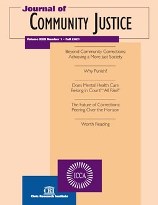Trauma: The Not So Silent Undercurrent for Refugees in Community Corrections Programs
Author: Jim Struve, LCSW.; Joanna Colrain, LPC, CGP, ACS.
Source: Volume 27, Number 03, Spring 2018 , pp.7-12(6)

< previous article |next article > |return to table of contents
Abstract:
Involuntary displacement and migration has increased in recent years due to political instability, ethnic/racial/religious polarization, and organized political violence that targets civilian populations. Trauma-informed services need to be standard procedure when working with refugee immigrants who have become entangled with legal systems. This article addresses the importance of community corrections providers recognizing the complexities of intersecting dimensions of psychological trauma for refugees and discusses four common components of refugee trauma: traumatic stress, resettlement stress, acculturation stress, and isolation stress. Shifting the intervention framework to posttraumatic stress “injury,” as opposed to the traditional medical model paradigm of “disorder,” alters the manner of client engagement to a more compassionate, humane, and empowering relationship. The authors describe the elements and benefits of this framework and discuss provider self-care as a core value of trauma-informed services benefiting both trauma survivors and providers.Keywords: Refugees, trauma-informed services, posttraumatic stress injury, asylum-seeker, internally displaced persons
Affiliations:
1: Healthy Minds Group; 2: Healthy Minds Group.